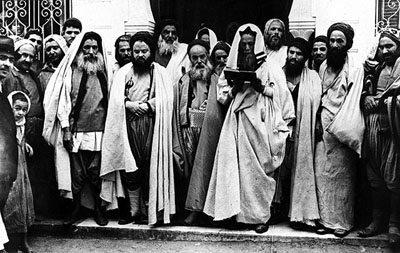
Tunisian Jews scapegoated in anti-austerity revolt?

A Jewish school on the Tunisian island of Djerba, home to one of North Africa's ancient indigenous Jewish communities, was attacked Jan. 9 as anti-government protests raged elsewhere around the country. Petrol bombs hurled at the school caused property damage but no injuries, the head of the local Jewish community, Perez Trabelsi, told Reuters. Trabelsi suggested the assailants exploited the fact that there was a reduced security presence in Djerba, as police were occupied elsewhere repressing anti-austerity protests. "Unknown people took the opportunity of the protests and threw Molotov cocktails into the lobby of a Jewish religious school in Djerba," he said. (Haaretz)
We note with foreboding that the recent anti-austerity protests in Iran also coincided with attacks on two synagogues in Shiraz. And in another recent example from outside the Middle East/North Africa region, shockingly blatant anti-Semitic scapegoating was seen in a column in El Nuevo Día, Puerto Rico's biggest newspaper, explicitly blaming "The Jew" for the continuing abandonment of the island amid devastation months after Hurricane Maria. (This ugly faux pas by columnist Wilda Rodríguez was reported by The Forward, and Nuevo Día did run a sort of half-hearted semi-retraction that was appended to the column after the fact—but why does it fall to the Jewish press to call out this jive?)
There have been anti-Jewish attacks reoprted in Tunisia in the past years—including somethat may not have actually happened. But some quite undeniably did. Djerba's historic synagogue was the scene of an April 2002 truck-bombing, apparently carried out by Qaeda-linked elements. There was also a tinge of Judeophobia to the November 2014 protests over the visit of Bernard Henry Levy to Tunisia (however an odious figure he may actually be). Despite all of this—and political dominance of the "moderate" Islamist Ennahda party since the 2011 revolution—Tunisian Jews have resisted Zionist pressure to make aliyah. We vigorously applaud this. But it is incumbent on the progressive forces in Tunisia (and around the world) to unequivocally confront and repudiate the forces behind these attacks—and resist the temptation to scapegoat Jews for the country's economic agony.
